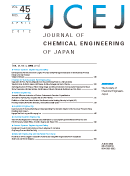
JOURNAL OF CHEMICAL ENGINEERING OF JAPAN
Scope & Guideline
Illuminating Pathways for Future Chemical Discoveries
Introduction
Aims and Scopes
- Energy and Sustainability:
Research on energy systems, including renewable energy sources, energy storage technologies, and sustainable chemical processes aimed at reducing environmental impact. - Catalysis and Reaction Engineering:
Studies focused on catalytic processes, including the development of new catalysts, reaction mechanisms, and optimization of reaction conditions for various chemical transformations. - Separation Processes:
Innovations in separation technologies, including membrane technology, adsorption, and crystallization processes designed to enhance efficiency and selectivity. - Material Science and Engineering:
Exploration of new materials, including polymers, nanomaterials, and composites, and their applications in various engineering fields. - Process Modeling and Simulation:
Development of mathematical models and simulations to predict and optimize chemical processes, enhancing understanding and efficiency in chemical engineering. - Biochemical Engineering:
Research on the application of biochemical processes, including bioreactors, biofuels, and bioprocessing techniques, with a focus on sustainability and efficiency. - Environmental Engineering:
Studies addressing environmental challenges through chemical engineering solutions, including waste treatment, pollution control, and resource recovery. - Computational Methods in Chemical Engineering:
Application of computational techniques, including machine learning and data-driven approaches, to improve process design and operation.
Trending and Emerging
- Sustainable Chemical Processes:
There is an increasing emphasis on green chemistry and processes that minimize waste and energy consumption, reflecting global sustainability goals. - Advanced Catalysis:
Innovations in catalyst design and function, including nanocatalysts and multifunctional catalysts, are receiving heightened attention for their potential to enhance reaction efficiencies. - Data-Driven Optimization:
The application of machine learning and AI techniques for optimizing chemical processes is rapidly growing, showcasing the integration of computational methods in practical applications. - Biomass and Biofuels:
Research into biomass conversion technologies and biofuels is rising, driven by the need for renewable energy sources and waste valorization. - Membrane Technologies:
Advancements in membrane separation technologies for applications such as CO2 capture and water purification are increasingly prevalent, indicating a focus on innovative separation methods. - Microfluidics and Lab-on-a-Chip Technologies:
The emergence of microreactors and lab-on-a-chip systems is gaining popularity, promoting miniaturization and efficiency in chemical processes. - Circular Economy in Chemical Engineering:
Research focusing on recycling, waste management, and resource recovery is becoming more prominent, aligning with global trends towards a circular economy.
Declining or Waning
- Conventional Energy Sources:
Research focused on traditional fossil fuel-based energy systems is decreasing, reflecting a shift towards renewable energy and sustainability. - Classical Separation Techniques:
Topics related to conventional separation methods, such as basic distillation and extraction processes, are becoming less frequent as more advanced technologies gain traction. - Basic Thermodynamics:
Papers discussing fundamental thermodynamic principles without applied context are less common, indicating a move towards more application-driven research. - Generic Chemical Processes:
Studies that do not incorporate innovative methodologies or technologies in existing chemical processes are being overshadowed by more novel approaches. - Traditional Material Characterization:
Research focused solely on conventional characterization methods without integration of advanced techniques or applications is seeing a decline.
Similar Journals
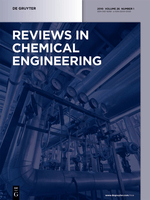
REVIEWS IN CHEMICAL ENGINEERING
Unveiling Cutting-edge Developments in the Field.REVIEWS IN CHEMICAL ENGINEERING, published by Walter de Gruyter GmbH, is a premier journal that delivers cutting-edge insights and comprehensive reviews in the field of chemical engineering. Established as an eminent resource since 1982, this journal is committed to advancing knowledge and fostering innovation in various domains of chemical engineering, including process design, materials, and environmental considerations. With an impressive Q1 ranking in the 2023 Scopus category for Chemical Engineering and a commendable 20th position out of 273 journals, it is recognized for its rigorous peer-review process and high-impact contributions. Although it operates under a subscription model, the journal remains a vital platform for researchers and professionals aiming to stay at the forefront of technological advancements and scholarly discourse in chemical engineering. With a focus on interdisciplinary applications and real-world relevance, REVIEWS IN CHEMICAL ENGINEERING is an indispensable resource for academics, industry professionals, and students dedicated to excellence in this field.

Solid Fuel Chemistry
Transforming Knowledge into Energy InnovationsSolid Fuel Chemistry is a pivotal journal published by PLEIADES PUBLISHING INC, dedicated to advancing knowledge in the fields of chemical engineering, chemistry, and fuel technology. With its ISSN 0361-5219 and E-ISSN 1934-8029, this esteemed publication has been contributing to the scientific community since its inception, covering extensive research from 1975 to 2024. Operating within the Q3 and Q4 quartiles, it holds a significant position among peers in its categories, ranked 94th in Energy & Fuel Technology and 212th in General Chemical Engineering. Although it lacks an open access option, the journal remains a vital resource for researchers, professionals, and students eager to explore innovative developments in solid fuels and their applications. The articles published in Solid Fuel Chemistry provide essential insights, facilitate collaboration, and inspire further research, making it an indispensable platform for anyone engaged in this essential field of study.

Journal of the Pakistan Institute of Chemical Engineers
Exploring New Frontiers in Chemical Engineering Practice.The Journal of the Pakistan Institute of Chemical Engineers serves as a pivotal platform for advancing the field of chemical engineering within Pakistan and beyond. Published by the Pakistan Institute of Chemical Engineers, this journal aims to disseminate high-quality research, reviews, and case studies that cover a wide scope of topics relevant to chemical engineering, including process design, environmental technology, and materials science. Although it operates under a non-open access model, the journal is committed to maintaining rigorous peer-review standards to ensure the publication of impactful articles that contribute to the advancement of knowledge and best practices in the discipline. As a hub for researchers, professionals, and students alike, this journal not only fosters academic collaboration but also plays an integral role in shaping the future of chemical engineering in the region. With an ISSN of 1813-4092, it is dedicated to enhancing the visibility and accessibility of chemical engineering research, promoting innovation and education within the field.
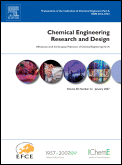
CHEMICAL ENGINEERING RESEARCH & DESIGN
Catalyzing Progress in Chemical Research and Application.CHEMICAL ENGINEERING RESEARCH & DESIGN is a prestigious journal that has been at the forefront of dissemination in the fields of chemical engineering and general chemistry since its inception in 1983. Published by Elsevier, the journal features a rich array of research articles that contribute to both theoretical and practical advancements in the discipline. With an impact factor that positions it strongly within the Q2 quartile for both Chemical Engineering and Chemistry categories, it occupies an esteemed place in the academic community, being ranked #77 out of 273 in Chemical Engineering and #111 out of 408 in General Chemistry on Scopus. Researchers and professionals will find it an invaluable resource for cutting-edge research and innovative methodologies that shape the future of chemical engineering applications. While the journal does not currently offer open access, it remains accessible through institutional subscriptions, ensuring that important findings continue to reach a broad audience. With a scope that is poised to expand through 2024, the journal aims to foster collaboration and knowledge sharing, supporting the continuous evolution of the field.

Frontiers in Chemical Engineering
Fostering Collaboration for a Sustainable FutureFrontiers in Chemical Engineering is an esteemed open-access journal published by Frontiers Media SA, dedicated to advancing knowledge in the dynamic field of chemical engineering. Since its inception in 2019, this journal has rapidly gained recognition for its rigorous peer-reviewed articles and innovative research contributions, achieving notable quartile rankings such as Q2 in Chemical Engineering and Q3 in both Bioengineering and Catalysis by 2023. With an emphasis on providing accessible and cutting-edge research, the journal caters to a diverse audience of researchers, professionals, and students interested in the latest developments and methodologies within the chemical engineering discipline. Hailing from Lausanne, Switzerland, Frontiers in Chemical Engineering embodies a commitment to enhancing collaborative scientific communication, making crucial research findings available without barrier. By publishing high-quality articles that address both theoretical advancements and practical applications in chemical engineering, this journal serves as a pivotal resource for fostering innovation and collaboration across the global research community.
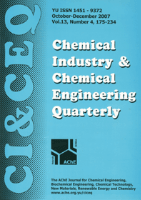
Chemical Industry & Chemical Engineering Quarterly
Pioneering Research for a Sustainable Chemical Future.Chemical Industry & Chemical Engineering Quarterly is a distinguished, open-access journal published by ASSOC CHEMICAL ENG that serves as a vital platform for innovative research within the field of chemical engineering. Established in 2000 and actively disseminating knowledge since then, this journal has garnered acknowledgment for its contribution to the field, currently being ranked in the third quartile (Q3) of Chemical Engineering (Miscellaneous) for 2023. With a focus on advancing understanding of chemical processes and facilitating the integration of industry operations with engineering principles, it provides a forum for both theoretical and applied research. The journal is committed to maintaining high standards of academic rigor, supported by its indexed presence in Scopus, where it ranks #173 out of 273 in the general chemical engineering category. As an open-access journal, it promotes the rapid dissemination of research findings, enhancing accessibility for scholars, professionals, and students worldwide. Based in Serbia, the journal is an essential resource for those seeking to stay at the forefront of chemical engineering advancements.

THEORETICAL FOUNDATIONS OF CHEMICAL ENGINEERING
Fostering Scholarly Communication in Chemical SciencesTHEORETICAL FOUNDATIONS OF CHEMICAL ENGINEERING is an esteemed academic journal published by PLEIADES PUBLISHING INC, dedicated to advancing the field of chemical engineering and chemistry through rigorous theoretical discourse and scholarly communication. With a history of publication dating back to 1974, the journal has been a vital resource for researchers and professionals, contributing to the foundation of knowledge in this multidisciplinary domain. Although it does not offer open-access options, it remains an essential platform for innovative research, boasting a 2023 ranking in the Q3 quartile for both Chemical Engineering and General Chemistry categories. The journal is indexed in Scopus, where it ranks #210 out of 273 in Chemical Engineering and #317 out of 408 in Chemistry, emphasizing its growing relevance within the scholarly community. Researchers, educators, and students alike can benefit from the insights and findings shared within its pages, making it a critical venue for those seeking to enhance their expertise in theoretical chemical engineering.

KOREAN JOURNAL OF CHEMICAL ENGINEERING
Fostering Global Collaboration in Chemical Research.The Korean Journal of Chemical Engineering is a prestigious publication by the Korean Institute of Chemical Engineers, dedicated to advancing the field of chemical engineering and its associated sciences. Established in 1984, this journal has made significant contributions to the dissemination of innovative research, covering a broad spectrum of topics within chemical engineering and general chemistry. With a current impact factor placing it in the Q2 quartile within both the chemical engineering and chemistry categories, it is recognized for its rigorous peer-review process and high-quality articles. The journal provides a valuable platform for researchers, professionals, and students to share their findings and collaborate on emerging methodologies and technologies. Although it does not offer open access options, its broad international readership, bolstered by its Scopus rankings — including a commendable #108 in general chemical engineering — ensures widespread visibility and dissemination of published works. As it approaches its 40th anniversary in 2024, the Korean Journal of Chemical Engineering continues to be an essential resource for anyone engaged in the field, driving innovation and academic dialogue worldwide.

Green Chemical Engineering
Advancing sustainable solutions for a greener tomorrow.Green Chemical Engineering, an esteemed journal published by KEAI PUBLISHING LTD, plays a pivotal role in advancing the field of sustainable chemical engineering. With an Open Access policy since 2020, this journal facilitates the free exchange of cutting-edge research and innovations that address critical environmental challenges. Based in China, it has rapidly gained recognition with impressive category quartiles, ranking Q1 in numerous relevant fields including Catalysis, Chemical Engineering (miscellaneous), Filtration and Separation, and Process Chemistry and Technology. Its presence in Scopus highlights its significance, with top rankings (e.g., Rank #4/19 in Filtration and Separation) placing it in the upper echelons of chemical engineering literature. Designed for researchers, professionals, and students alike, Green Chemical Engineering aims to foster a collaborative platform for the dissemination of pioneering work that contributes to a greener and more sustainable future.
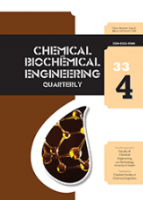
CHEMICAL AND BIOCHEMICAL ENGINEERING QUARTERLY
Bridging Academia and Industry in Chemical InnovationsCHEMICAL AND BIOCHEMICAL ENGINEERING QUARTERLY, published by the Croatian Society of Chemical Engineering Technology, is a distinguished open-access journal that has been providing a platform for the dissemination of innovative research since its inception in 1987. With a focus on the fields of biochemistry and chemical engineering, this quarterly journal addresses a wide array of topics, including process chemistry and technology, making significant contributions to both academia and industry. Despite its current positioning in the Q4 category for biochemistry and Q3 for miscellaneous chemistry and process chemistry in 2023, the journal continues to strive for greater impact, catering to researchers, professionals, and students alike. Its open-access model, in place since 2001, ensures that cutting-edge research is accessible to a broad audience, fostering collaboration and knowledge sharing within the scientific community. By promoting high-quality research and providing insights into the latest advancements, Chemical and Biochemical Engineering Quarterly remains an essential resource for those involved in the chemical and biochemical engineering disciplines.